
The protests sweeping the Middle East have motivated thousands of Kurds from all walks of life to demonstrate in cities across Iraqi Kurdistan, an autonomous region in northern Iraq. While their demands—an end to widespread corruption and greater civil and political rights—have been more modest than their regime-change-seeking counterparts in neighboring countries, the democratically elected Kurdistan Regional Government (KRG) has reacted to these protests in much the same way as despots around the region.
Since February 17, clashes with security forces have killed at least eight protesters and bystanders and injured more than 250 demonstrators in Iraqi Kurdistan. Security forces and their proxies also have repressed journalists through threats, arbitrary arrests, beatings and harassment, and by confiscating and destroying their equipment. On April 17, KRG security forces widened their crackdown on protesters and journalists by opening fire on demonstrators and beating some severely.
In March, Human Rights Watch researcher Samer Muscati traveled across Iraqi Kurdistan to monitor the protests and the government’s reaction to them.
Credit: Samer Muscati/Human Rights Watch

Despite the risks from security forces, thousands across Iraqi Kurdistan continue to protest widespread corruption and the fact that the Kurdistan Democratic Party and the Patriotic Union of Kurdistan have dominated all political matters in the region for the past two decades.
Credit: Samer Muscati/Human Rights Watch
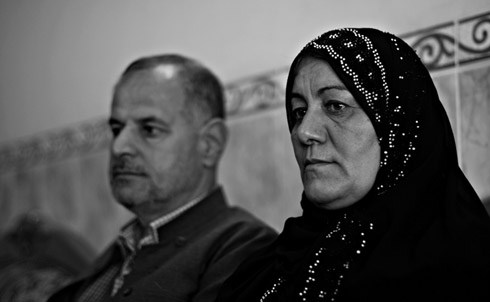
On the afternoon of February 17, officials at a hospital in Sulaimaniya called Rezhwan Ali’s parents, Haji Ali Kashi and Dlsoz Abdulla Mustafa (shown here on March 19), to collect the body of their 15-year-old son. Earlier that day, security forces, including some in uniform, fired live ammunition at protesters in the city, killing Ali, after hundreds marched to the offices of the Kurdistan Democratic Party and started throwing rocks.
Credit: Samer Muscati/Human Rights Watch
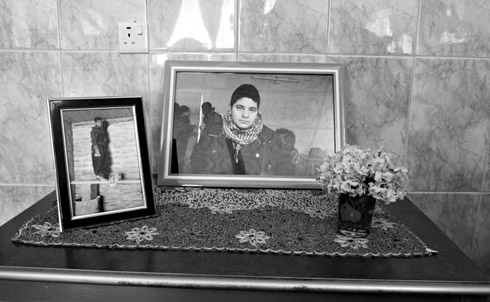
Rezhwan Ali died instantly after he was shot in the head. At least 50 others were injured at the February 17 demonstration.
Credit: Samer Muscati/Human Rights Watch
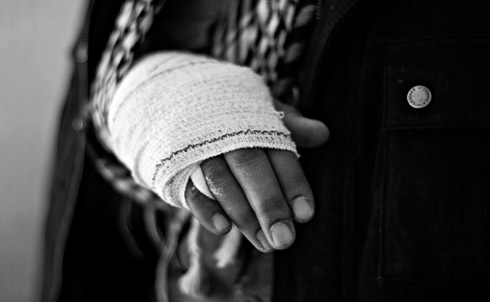
This photojournalist was shot in the right hand by KDP security forces during the February 17 protest in front of the KDP building in Sulaimaniya. “There were bullets flying everywhere,” he recounted. “Most of the people they shot and injured were fleeing the protests.” He never gave a statement to the police because he feared retribution. “We all know what happens to journalists here.”
Credit: Samer Muscati/Human Rights Watch
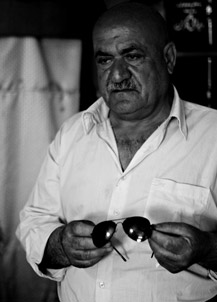
In the afternoon on February 19, plainclothes security forces shot into a crowd of demonstrators in Sulaimaniya’s Khanaqa Square, killing two, including 16-year-old Surkew Zahir. His father, Zahir Muhmood Khardaghi, holds one of Surkew’s favorite possessions—a pair of sunglasses. Khardaghi said that he quietly buried his son the morning after he was killed.
Credit: Samer Muscati/Human Rights Watch
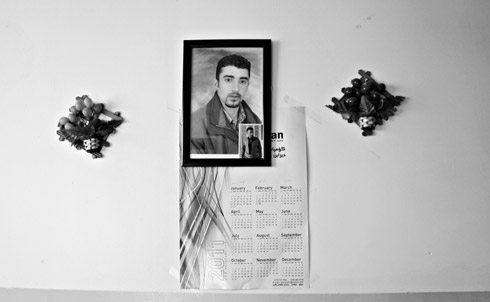
Sherzad Taha was also killed in the Sulaimaniya protest on February 19. Video and photo footage of the crackdown shows assailants firing directly into the crowd of demonstrators.
Credit: Samer Muscati/Human Rights Watch
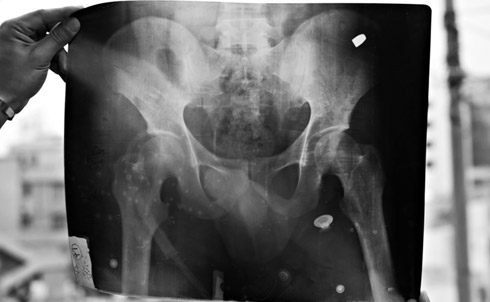
Taha, 28, was shot twice, and one bullet lodged in his pelvis as shown by his x-ray.
Credit: Samer Muscati/Human Rights Watch
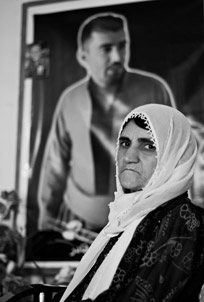
After waking up from an emergency operation at about 11 p.m. on February 19, Taha told his parents, “Don’t worry, I’m going to be okay.” He died shortly thereafter.
Credit: Samer Muscati/Human Rights Watch

On February 20, dozens of armed men stormed the headquarters of the independent Nalia Radio and Television (NRT) station in Sulaimaniya, shooting up broadcasting equipment and wounding a guard. The gunmen then doused the premises with gasoline and set fire to the building, according to the station’s staff. NRT, which broadcast footage of the protests, had begun its inaugural broadcast only two days before the attack.
Credit: Samer Muscati/Human Rights Watch

NRT station’s director and journalists received anonymous death threats before and after the attack.
Credit: Samer Muscati/Human Rights Watch

On 26 February, a bullet killed bystander Omed Jalal Darwesh after unknown gunmen fired live ammunition near Sulaimaniya’s Sara Square. “He only went there to buy groceries at the market,” said his wife of 19 months, Sazgar Fareeq Abdullah, on March 19. “I still can’t believe he’s gone.”
Credit: Samer Muscati/Human Rights Watch

Zana Ali Ghazi, 32, said that while he was trying to report on a protest in the city of Saeed Sadiq on March 15, eight armed men, some in uniform, cracked three of his ribs and beat him with wooden clubs and Kalashnikovs until he lost consciousness. “They insulted my mother and sister when they were beating me,” said the journalist with the Kurdistan News Network (KNN), a satellite television channel affiliated with the Kurdish opposition party Goran. “They told me that if I continued to cover this type of news, they would kill me.”
Credit: Samer Muscati/Human Rights Watch

Student protester Nariman Latif Nasrulla said he suffered a gash in his head from a police attack on March 15 during a demonstration in Saeed Sadiq. A day later, he holds up the sign decrying poor government services that he carried at the protest.
Credit: Samer Muscati/Human Rights Watch

On April 18, security forces violently seized control of Sulaimaniya’s Sara Square, the center of daily protests in the city since February 17.
Credit: Samer Muscati/Human Rights Watch

On April 19, the government’s Security Committee for Sulaimaniya Province banned all unlicensed demonstrations. Legislation passed by the Kurdistan Regional Government in December gives authorities wide discretion to decide whether to approve a license for a protest. These posters, in Sulaimaniya’s Sara Square, honor the demonstrators and bystanders that have been killed in the protests.
Credit: Samer Muscati/Human Rights Watch

In Halabja on March 16, protesters gave security forces flowers.
Despite the Kurdistan Regional Government’s claim that it has trained security forces to respect basic rights, the response of those forces to the ongoing demonstrations has shown a different reality. How the government continues to deal with these protests will be a real test of whether—after more than eight years of occupation and police and military training by the United States and its allies—Iraqi Kurdistan embraces human rights or reverts to a police state.
Credit: Samer Muscati/Human Rights Watch


